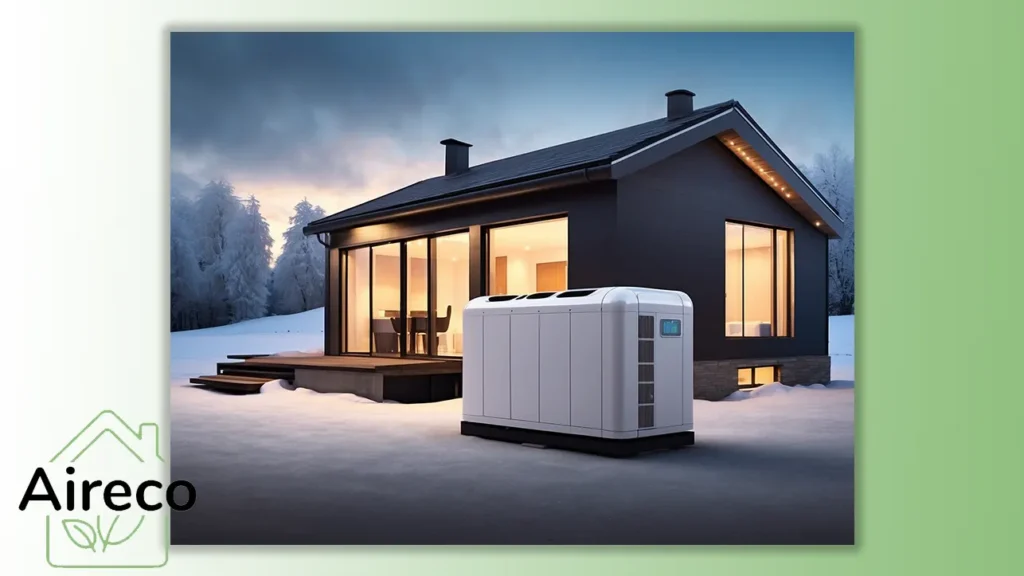
A heat pump is a device that transfers heat energy from a source of heat to a destination called a “heat sink.” Heat pumps move thermal energy in the opposite direction of spontaneous heat transfer, by absorbing heat from a cold space and releasing it to a warmer one. This article will delve into the intricacies of heat pumps, their need to run continuously, their efficiency, and the impact of their continuous operation on their lifespan, cost, environmental impact, comfort factor, and safety.
Understanding Heat Pumps
How Heat Pumps Work
Heat pumps work on the principle of heat transfer. They use a refrigerant to absorb heat from one place and release it in another. The refrigerant absorbs heat from the outside air, even in cold weather, and transfers it indoors. The process can be reversed in summer to cool the home.
Different Types of Heat Pumps
There are three main types of heat pumps: air-source, ground-source, and absorption. Air-source heat pumps are the most common and transfer heat between your home and the outside air. Ground-source, or geothermal heat pumps, transfer heat between your home and the ground or a nearby water source. Absorption heat pumps are driven by a heat source such as natural gas, solar power, or geothermally heated water.
The Need for Heat Pumps to Run Continuously
Why Heat Pumps Might Need to Run All Night
Heat pumps might need to run all night during extremely cold weather. This is because the heat pump is working to maintain a consistent temperature in the home. If the outside temperature is very low, the heat pump needs to work harder and longer to keep up.
The Role of Thermostat Settings in Heat Pump Operation
The thermostat settings play a crucial role in the operation of a heat pump. If the thermostat is set to a high temperature, the heat pump will need to run continuously to reach that temperature. On the other hand, if the thermostat is set to a lower temperature, the heat pump may not need to run as often.
The Efficiency of Heat Pumps
How Heat Pumps Use Energy
Heat pumps are highly efficient because they simply move heat, rather than burn fuel to create it. This makes them a greener alternative to traditional heating systems. They use electricity to run, but the amount of heat they produce is greater than the amount of electricity they consume.
Comparison of Heat Pumps to Other Heating Systems
Compared to traditional heating systems, such as furnaces and boilers, heat pumps are more energy-efficient and cost-effective. While the initial cost of a heat pump can be higher, the lower operating costs can make it a more economical choice in the long run.
The Impact of Continuous Operation on Heat Pump Lifespan
The Wear and Tear of Continuous Operation
Like any mechanical system, continuous operation can lead to wear and tear on a heat pump. However, heat pumps are designed to run continuously and can handle the strain. Regular maintenance can help to mitigate the effects of wear and tear.
The Importance of Regular Maintenance
Regular maintenance is crucial to the longevity of a heat pump. This includes regular cleaning, checking for and repairing any leaks, and ensuring the system is running efficiently. Regular maintenance can help to prevent major issues and extend the lifespan of the heat pump.
The Cost Implications of Running a Heat Pump All Night
Analysis of Energy Consumption
Running a heat pump all night will naturally lead to increased energy consumption. However, because heat pumps are highly efficient, the increase in energy costs may not be as high as with other heating systems.
The Financial Implications of Continuous Operation
While running a heat pump all night will increase energy costs, it can also lead to a more comfortable home. The consistent temperature can prevent cold spots and make the home more enjoyable. Therefore, the financial implications need to be weighed against the comfort benefits.
The Environmental Impact of Running a Heat Pump All Night
The Carbon Footprint of Heat Pumps
Heat pumps have a lower carbon footprint than traditional heating systems. This is because they use electricity, rather than burning fossil fuels. While the electricity may come from a grid that uses fossil fuels, the efficiency of heat pumps means they still have a lower carbon footprint overall.
Comparison of Heat Pumps to Other Heating Systems in Terms of Environmental Impact
Compared to other heating systems, heat pumps have a lower environmental impact. They do not emit carbon dioxide or other greenhouse gases. Additionally, they use less energy, leading to less demand on the power grid.
The Comfort Factor
How Running a Heat Pump All Night Can Affect Comfort Levels
Running a heat pump all night can lead to a more comfortable home. The heat pump can maintain a consistent temperature throughout the home, preventing cold spots. This can be particularly beneficial in colder climates or during winter months.
The Role of Insulation in Maintaining Comfort
Insulation plays a crucial role in maintaining comfort when running a heat pump all night. Good insulation will keep the heat in and the cold out, making the heat pump more efficient and the home more comfortable.
The Safety of Running a Heat Pump All Night
Potential Safety Concerns
There are few safety concerns associated with running a heat pump all night. Heat pumps do not produce carbon monoxide, a dangerous byproduct of many heating systems. However, like any electrical system, there is a risk of electrical issues if the system is not properly maintained.
How to Ensure Safe Operation of a Heat Pump
To ensure safe operation of a heat pump, regular maintenance is crucial. This includes cleaning, checking for leaks, and ensuring the system is running efficiently. Additionally, the heat pump should be installed by a professional to ensure it is set up correctly.
Case Studies
Examples of Homes Where Heat Pumps Run All Night
There are many examples of homes where heat pumps run all night. In colder climates, it is common for heat pumps to run continuously during the winter months. These homes often have high levels of insulation to keep the heat in and the cold out.
Lessons Learned from These Case Studies
The main lesson from these case studies is that heat pumps can run all night without major issues. However, regular maintenance is crucial to ensure the longevity of the system. Additionally, insulation plays a key role in maintaining comfort and efficiency.

Expert Opinions
Quotes from HVAC Professionals About Running Heat Pumps All Night
Many HVAC professionals recommend running heat pumps all night in colder weather. As one expert puts it, “Heat pumps are designed to run continuously and are very efficient. As long as the system is well-maintained, there should be no issues with running it all night.”
Differing Opinions in the Industry
However, there are differing opinions in the industry. Some professionals recommend using a secondary heat source in extremely cold weather to reduce strain on the heat pump. As always, it’s best to consult with a professional to determine what’s best for your specific situation.
Alternatives to Running a Heat Pump All Night
Other Heating Options
There are other heating options available, such as furnaces, boilers, and space heaters. These can be used as a primary or secondary heat source, depending on your needs.
The Benefits and Drawbacks of These Alternatives
While these alternatives can provide heat, they often have higher operating costs and a larger carbon footprint than heat pumps. However, they can be useful in extremely cold climates where a heat pump may struggle to keep up.
Conclusion
In conclusion, it’s generally okay for a heat pump to run all night, especially in colder weather. Heat pumps are efficient, have a lower carbon footprint than other heating systems, and can provide a comfortable, consistent temperature. However, regular maintenance is crucial to ensure the longevity and efficiency of the system.
Recommendations
Suggestions for Homeowners Considering Running Their Heat Pump All Night
For homeowners considering running their heat pump all night, it’s important to ensure the system is well-maintained. Regular cleaning and checks for leaks can help to prevent major issues. Additionally, good insulation can help to keep the home comfortable and the heat pump efficient.
Tips for Maintaining a Heat Pump
Regular maintenance is crucial for the longevity of a heat pump. This includes cleaning the filters, checking for leaks, and ensuring the system is running efficiently. It’s also important to have the system serviced by a professional at least once a year.
Future Research Directions
Areas Where More Research is Needed
More research is needed into the long-term effects of running a heat pump all night. This includes the impact on the lifespan of the system, the cost implications, and the environmental impact.
How Future Advancements Might Change the Conversation
Future advancements in heat pump technology could make them even more efficient and cost-effective. This could change the conversation around running heat pumps all night and make them an even more attractive option for homeowners.
FAQ
Is it okay to run my heat pump all night?
Yes, it’s generally okay to run your heat pump all night, especially in colder weather. However, regular maintenance is crucial to ensure the longevity and efficiency of the system.
How can I maintain my heat pump?
Regular maintenance includes cleaning the filters, checking for leaks, and ensuring the system is running efficiently. It’s also important to have the system serviced by a professional at least once a year.
Are there alternatives to running a heat pump all night?
Yes, there are other heating options available, such as furnaces, boilers, and space heaters. These can be used as a primary or secondary heat source, depending on your needs.
What are the environmental implications of running a heat pump all night?
Heat pumps have a lower carbon footprint than traditional heating systems. They use electricity, rather than burning fossil fuels, and are highly efficient.
What are the cost implications of running a heat pump all night?
While running a heat pump all night will increase energy costs, it can also lead to a more comfortable home. The consistent temperature can prevent cold spots and make the home more enjoyable.
